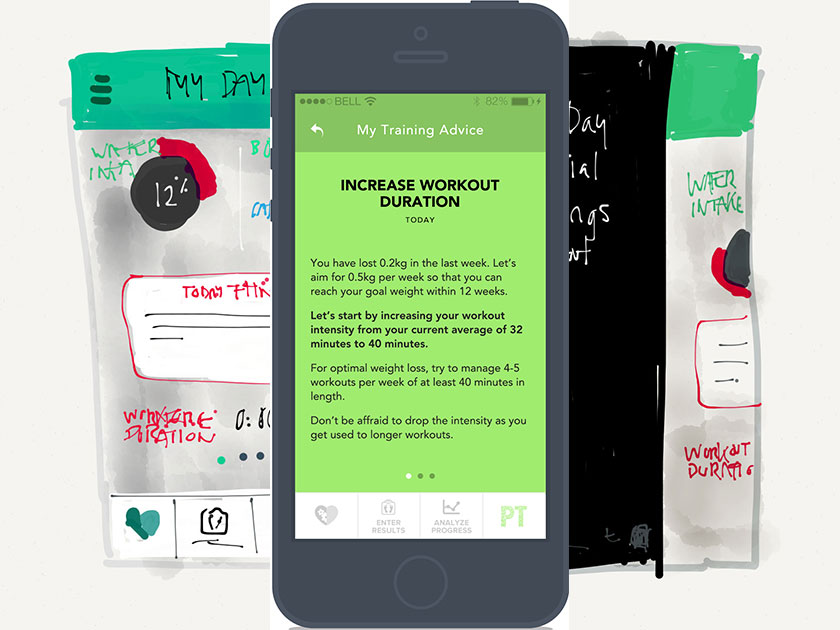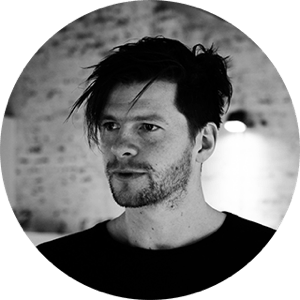Edit Aug 27 – I’ve made some minor edits to the post. Upon reflection it didn’t tell the story as it was intended and came across harsher on our developer than I meant or felt.
At the end of the day, I haven’t led us to funding or significant-enough traction to pay him what he needs or deserves.
A team consisting of a product designer, personal trainer and a developer release an app.
App launches.
Developer’s personal circumstances change at about the same time. Suddenly, priorities change, things slow down, users find bugs and we find ourselves stuck.
Occasionally life throws things at you that completely change plans. The kind of things that aren’t anyones fault. Sometimes they’re the kind of things that are wonderful, yet counterproductive to your goals.
Here’s some notes on the past few months working building BodyWise
The last thirty days at BodyWise have been the toughest by a mile. As a guy that can design, make web things, has plenty of ideas and studied entrepreneurship, I’ve felt that my best ability was the ability to ship. I could come up with an idea and have always found a way of making it happen.
That skill-set has seen us launch a big app like BodyWise for less than $30k.

The lead up to launch
Our developer was on board for a mix of sweet sweet cash and a bit of equity. The equity was more to signify that we welcomed him to our team as one of us and a key cog in building out our vision. With a wife, mortgage and joining us a few months in, he didn’t have the same burning passion as us and was understandably always more motivated by the cash than Dave and myself who had the usual bills but no major commitments.
For the most part, he was fantastic and we got a hell of a lot done on a small budget. The project blew out from his initial estimation. Our penciled-in launch day came and passed. I told people the new date. That came and passed. Rinse and repeat.
Two months after the initial launch day I sent the email that I thought needed to be sent. “Fuck it. We need to launch” it said, or something along those lines.
He was nervous but I said I was OK with some bugs. I knew it was under-tested. I hadn’t even tested the FitBit/Jawbone integration that was so key to the user experience and that made getting data into the app easy.
So, we launched. The 14 days waiting in review with Apple were the longest 14 days of my life. A little nervous but mostly excited, ‘Your app is processing’ popped up on my screen. An hour later and it was on the phones of people in five continents.
Life gets in the way
We launched. As expected, there were bugs. Unfortunately, the bugs were pretty major. Facebook sign-up didn’t work for a lot of people (we pushed that as the preferred sign-up option) and syncing your FitBit or Jawbone didn’t work at all.
Being that we went out saying that BodyWise will make your Fitbit or Jawbone more interesting and useful, this wasn’t good.
About then I found out that our developer and his wife just learnt that they were expecting their first child.
His goalposts changed.
Suddenly, he seemed pissed off how much unpaid work he was doing. We started to talk about working as a freelancer so he could get paid.
I was OK with that. He had a family to look after and being involved with a start-up undoubtably effects your personal life. We needed a way to make both work.
Two weeks passed and we had no particular resolution. He was becoming harder to reach with his time spent on other paying projects. The bugs remained and took a long time to work through. Nothing seemed to be getting done on the back of a busy scheduled and time lost with the app in review with Apple. I was getting agitated.
I demanded a quote so we could put something in place and start working on the three parts of the app that we knew needed improvement, not to mention the two major bugs. The quote came back. “Fuck me mate, we can’t do that” I said to Dave. There was a sinking feeling that we had a major problem on our hands.
The quote had no discount. We were a self-funded start-up with limited cash. We’d sold businesses, put our income on the line and spent our house savings. We couldn’t afford the full-fee rates of a good developer after everything we’d invested. That wasn’t his fault, but it was the situation we were in.
We started to realize that his heart wasn’t in it as much as we wanted it to be. His circumstances had changed and as angry as I was, I knew he was doing the right thing by him and his family. If I was him, I don’t know if I’d be able to offer a discount or take on a project that was going to mean a little more stress on my wife, or having a few grand less in the bank to spend on my child.
At one point we even tried to pay him what he initially quoted, but by that point it was clear he wanted longer-term projects with more financial certainty.
Where the hell does that leave us?
The month or two since launch have seen bugger all happen on the development front. I’ve been scared, stressed and under-rested, wondering what is going to happen. For the first real time in my entrepreneurial life, I feel like things are out of my hands.
In a tech startup, all the best product design and management skills in the world don’t count for shit if you can’t get code written.
We needed a new developer but finding one proved 100x harder than I though it would. Not that I was experienced enough to realize it at the time but the decisions that I made earlier in development increased our risk and tied us closer to him. The more specialized your technology is, the narrower talent pool you have to pick from and with a single techie within a tech business, you have enormous risk.
What didn’t dawn on me that the iOS app & the backend server required separate skill-sets and that finding someone who is a gun at both and can pick up and understand the algorithms that we’ve built (but not yet released) would be incredibly hard in a place like Melbourne, especially without funding. Finding another talented Python developer with top notch Objective-C skills who isn’t snapped up by an agency or software company seemed impossible.
It would be easy enough finding a freelance iOS dev & a freelance Python dev but thats two sets of fees and potentially a dev-ops nightmare without a highly technical person left in the founding team.
Buying time
BodyWise can and I hope will be incredible. If we get it right, we will make tens of millions of people healthier and happier and make plenty of money for us and our investors in doing so. We can use the data from your iWatch, phone, FitBit, Jawbone or away-from-tech life to train you with more relevance, context and overall effectiveness than anything out there in the world.
Our product pathway is incredibly strong, we’ve got significant interest within healthcare, over 40,000 users and a decent position in a booming market at the heart of a major technology shift.
But, we’re on the ropes, spending our last dollars before going back to our personal assets and working out whats left to contribute.
We’ve got a developer on board for the short-term, building the three things that we feel the product desperately needs. Our old developer has been good and just about fixed the sign-up bug and sort of fixed the FitBit & Jawbone bug. Things are happening.
There’s no build it, learn, iterate, learn, iterate again approach for us with our resources right now though. We have to make some big calls on the product and hope to God we get them right.
I don’t know what will happen.
If you know a quality technical person wanting to take on the fitness training industry, FitBit, MyFitnessPal and the Jenny Craigs of the world, let me know.

